I spent nearly 4 years in Vietnam working in the insurance industry, helping expats manage risk. Now claims are a nightmare wherever you are in the world, but add on Vietnam’s unnatural love of red tape and potential language barrier issues, and you’re in for a world of fun…
When filing an insurance claim in Vietnam, there’s a unique process to follow, specific paperwork to complete, and pitfalls to avoid. This guide will try to show you the ropes and provide you with a few tips and tricks when it comes to filing an insurance claim in Vietnam.
What is an Insurance Claim?
First, the basics. An insurance claim is a formal request made by you, the insured, to an insurance company in order to get reimbursed for a covered loss or policy event. Covered loss, means something that you are actually insured for by your insurance policy. If you only have emergency coverage, then dental work won’t be a covered loss, for example.
The insurance company will then validate your claim by reviewing your medical reports, claim form and invoices (to make sure you actually paid for what you’re claiming for) and will then approve or decline your claim.
In simpler terms, an insurance claim is your way of saying to your insurance company, “Hey, I paid for something that happened that’s covered under my policy, and I’d like to receive the money back from you, please.”
Knowing how to file an insurance claim is also important because any medical expenses paid on your behalf can significantly affect your financial stability. And, if you’re already struggling to navigate your personal finances in Vietnam, adding insurance admin to the mix is far from ideal.
Insurance Claim Là Gì
In Vietnamese, the phrase “insurance claim” translates to “bảo hiểm yêu cầu,”. Obviously, insurance claims in Vietnam incorporate the same process that I just described, but it’s important to understand the local nuances, especially when navigating the insurance landscape in the country due to their shocking flexibility and overall lack of regulatory influence.
Despite these hurdles, the insurance industry has been growing rapidly in Vietnam, thanks to the rising awareness of the benefits of insurance among Vietnamese people, and as a result of significant marketing on the insurance providers’ side.
Breaking Down the Insurance Claim Process in Vietnam
Now that we’ve covered the basics, let’s dive into the nitty-gritty: the insurance claim process in Vietnam. Please note that the exact process may vary depending on your actual insurance provider, but they will all follow these steps in some form.
Summary of the Insurance Claim Process – My inside scoop is in Italic
Completing a Claim Form:
- Fill Out the Form Yourself: Accurately and thoroughly complete the claim form provided by your insurance company.
- Individuals often seem to think that submitting a medical report is enough, but the claim will not go anywhere without a complete claim form.
- Get the Doctor to Fill Out the Form: The attending physician will nearly always have to complete a section on the claim form.
- Sometimes they can do this after your visit, but if your medical visit is pre-planned, it’s easier to just bring the claim form along.
- Review for Accuracy: Double-check the form to ensure all information is correct and complete.
- Too many times have I seen Doctors record inaccurate information on a claim form. Since it is impossible to get Doctors to change their signed statement after the fact, make sure that it is correct before submitting anything to the insurer.
Submitting Claim Form and Medical Reports to Insurer:
- Compile Documentation: You will need the current medical report for the illness/incident at hand, accompanying x-rays etc., invoices, reimbursement bank details and your claim form when submitting a claim.
- A VAT invoice is required in Vietnam, or your claim will get rejected. VAT invoices prove that the medical clinic, physiotherapist, therapist etc. are legally registered and licenced to practice in the country.
- Submit to Insurer: Scan and submit all the documents to the insurance provider’s claims department via email.
- Submit your documents to your insurer as soon as humanly possible. Many insurance providers won’t accept claims submitted more than 3 months after the incident date.
- Keep Records: Retain copies of all submitted materials for your own records.
- Always retain the original copies as Vietnamese insurance providers like Bao Viet, PJICO, Bao Minh, Pacific Cross and Liberty, can technically request them before approving a claim.
Post-Submission:
- Confirmation of Receipt: Await confirmation from the insurer that they have received your claim.
- Follow-Up: If necessary, follow up with the insurer to check on the status of your claim.
- Cooperate with Evaluation: Be prepared to provide additional information if the insurance company requires further evaluation of your claim.
- Receive Outcome: The insurer will review the claim and inform you of their decision, which could be an approval, rejection, or a request for more information.
3 Tips to Successfully Filing an Insurance Claim in Vietnam
The first and most important tip I have for anyone filing an insurance claim in Vietnam is to double-check your claim form and the medical report before submitting it to the insurance provider. Any information that may indicate that an acute illness may not be an acute illness, shouldn’t be anywhere to be seen.
Secondly, don’t let your attending physician run tests that seem out of the blue, even for you. Especially if they are expensive. I’m not saying that Doctors are bad or wrong… I’m not a Doctor! But, international hospitals and clinics in Vietnam know that an insurance provider will more often than not foot the bill and so they may run unnecessary tests to increase revenue. Sadly, insurance providers will only pay for things that are medically necessary. If something is deemed not to be, you will be stuck with the bill.
For example, I know of an individual who received 4 MRIs at ~$350 per test within the span of a couple of weeks without any real justification as to why any previous MRIs weren’t sufficient. This will not fly with insurance providers when it comes to claim time.
Third and last. Unless you are in an emergency, always seek pre-authorisation from your insurance provider for any treatment that is even remotely invasive. I’m talking about going to the Doctor for a cough. But if the Doctor is planning on cutting you open or peaking inside you, speak to your insurer first.
A lot of insurers have rules surrounding pre-authorisation for ‘bigger’ treatment and if it isn’t sought then they will only cover a certain percentage of the bill.
The Biggest Insurance Mistake I See in Vietnam
Think of this as a bonus tip. But, the biggest mistake I see in Vietnam when it comes to insurance is how little people actually understand of their coverage and don’t take time to understand.
Insurance ≠ insurance. There are so many different types of providers, plans and policies, that any given insurance does not equal another.
A couple of examples.
- If you buy cheap local insurance then you will get poor customer service, poor claim handling and overall low coverage.
- If you are provided local insurance by your workplace, you will likely only be covered up ~$5,500/year for any and all treatment you may need. You may also have daily limits of ~$150. This is not sufficient if you suffer any serious injury or illness.
- A pre-existing condition is something that you have previously been diagnosed with even if it doesn’t bother you right now. Pre-existing conditions are rarely covered by insurance.
- Coverage limits! If you only opt for emergency and hospitalisation coverage, you will not be covered for outpatient visits. I.e. you will only be covered if you are admitted to a hospital bed, and not for day visits to a clinic.
- Direct billing means that your insurance provider is linked to certain hospitals whom they pay directly for your treatment. It does not mean you can get treatment and immediately leave. This is because your insurer still has to confirm with the clinic that the reason for your visit is covered by your insurance. This means that even with direct billing, you might have to wait a little while for confirmation of coverage.
Some things I’ve personally learned about filing an insurance claim in Vietnam
Excessive information in your medical report: Your attending physician will always include excessive information in your medical report from an insurance perspective. Sometimes, this information can cause havoc with your medical claim since claim departments read these reports with a fine-tooth comb. Go through it yourself first, and ask the Dr to not include anything in your report that isn’t directly related to the incident at hand.
For example: If you have torn a knee ligament, like your meniscus or ACL, and your physician asks you if you’ve ever had issues with your knee in the past, you might say yes simply because you once tripped and bumped your knee. The Dr will then put this in your medical report.
When the claim department gets a hold of this, they will likely infer that you might have had previous damage done to your knee. And, if this bump occurred prior to your insurance start date they would likely not cover your torn ligament.
Some things just aren’t covered: Your insurance policy will include something called Policy Documentation, Terms and Conditions or the like. Within this, is a section called ‘Exclusions’. While these rarely differ between insurers, you have to read through your policy’s exclusions to know what exactly is not covered.
Did you know that vitamins are never covered even when prescribed by a Doctor? Similarly, any conditions related to sleep apnea, or any other sleep-related disorder, will be automatically rejected.
Just because your partner paid for your insurance, doesn’t mean they will be reimbursed: The only person that can be reimbursed for an insurance claim is the person that is insured under the policy. Despite your friend, mum or partner paying for your insurance policy, they cannot receive reimbursements. So make sure you have a bank account in your name or you won’t be reimbursed.
Believe it or not, your name has to be correct on your medical report: John Smith is the insured person. If the medical report states that the clinic treated a John Smit or Jon Smith, you will have to fight tooth and nail to get your claim through. Doesn’t matter if your Date of Birth is the same and everything else matches. Vietnamese are sticklers for red tape.
The Importance of Health Insurance in Vietnam
Health insurance, in particular, is essential in Vietnam. With a dynamic healthcare landscape that includes both public and private sectors, having a robust health insurance plan can provide peace of mind and financial protection against unforeseen medical expenses.
In Vietnam, the government provides a basic level of health insurance. However, the coverage is quite limited, and the service at public hospitals can be unpredictable. That’s where private health insurance comes into play.
With private health insurance, you get access to a wider range of medical services, including high-end private hospitals, international clinics, and a variety of specialists. Plus, if you need to file a health insurance claim in Vietnam, the process tends to be faster and more straightforward with a private insurer than with the public system.
Don’t forego Life Insurance
If you have someone, anyone that depends on your income you have to consider life insurance. My article below dives into why.
Seeking Help: Insurance Claim Services in Vietnam
Unfortunately, there is no single entity that will help you when filing an insurance claim in Vietnam. It is up to you to do all the leg work, review your documents, submit them to the insurer and chase them for an outcome.
UNLESS you buy your insurance using a good insurance broker. Insurance brokers receive a bad reputation because people think they are just there to sell you a policy. This is in part true – it is there job. But the job also includes helping you:
- Get the exact coverage you need
- Find a policy within your budget
- Explain the ins and outs of your insurance policy
- Administer your plan and make amendments year in and out
- Submit your insurance claims, including getting medical reports from clinics and hospitals, collecting VAT invoices and amending any mistakes
Navigating the world of insurance in Vietnam is incredibly tricky, but not if you find an insurance broker who is willing to lend you a hand. I highly recommend you review a few brokers in your area, have a quick look at their online reviews and then go from there.
If all else fails, you can always consider a financial planner in your area. We usually have enough knowledge about insurance to give you a helping hand. Happy insuring!


